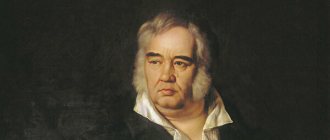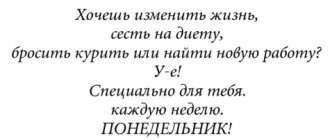Aphorisms and quotes by Thomas Hobbes
Thomas Hobbes, (1588–1679), English materialist philosopher, author of the legal concept of the social contract
From the infinite variety of images of their imagination, people have created an infinite number of types of gods.
Beauty is the promise of happiness.
Love is a person’s idea of his need for a person to whom he is attracted.
Fear of an invisible force, invented by the mind or imagined based on fiction... is called religion.
The natural state of people before the formation of society was war, and not only war in its ordinary form, but a war of all against all.
Man is a wolf to man.
Only in the state is there a universal scale for measuring virtues and vices. And only the laws of each state can serve on such a scale.
We find in human nature three main causes of war: firstly, rivalry, secondly, distrust, thirdly, the thirst for glory.
Beauty is power, since, being a promise of good, it attracts the love of women and strangers to men.
To know the properties of the state, it is necessary to first study the inclinations, affects and morals of people.
If geometric axioms affected people's interests, they would be refuted.
If I read everything that others have read, I would know no more than they know.
Loving a neighbor is something different from loving a neighbor.
The desire to please is not a sensual, but a spiritual pleasure and consists of the idea of one’s ability to give pleasure to others.
Happiness does not lie in the fact that we have succeeded in something, but in the success itself.
Every spiritual pleasure and every joy lies in owning such things, communication with which would allow us to have a high opinion of ourselves.
Good and evil are names that denote our inclinations or aversions.
Since each person wants everything for himself personally, he wants everything at the expense of another; and since everyone’s desires are the same, a war of all against all occurs.
A natural right is the freedom to do whatever, in a person’s opinion, is most appropriate for preserving one’s own life.
A person under the power of the state remains a wolf in relation to another person, but a wolf in other words. tamed.
It is a natural law that every man should pursue peace; if he cannot achieve it, then he can use any means that provide advantages in war.
Let people value themselves as highly as they like, their true value is not higher than what others value them at.
Once people have once acquired a wrong opinion, it is then impossible to reason with them, just as it is impossible to write legibly on soiled paper.
The natural cause of religion is anxiety about the future.
Truth and lies are attributes of speech, not of things. Where there is no speech, there is neither truth nor lie.
If geometric axioms affected the interests of people, they would have to be proven in each individual case.
Words are the playing chips of smart people and the money of fools.
Language is like a web: weak minds cling to words and become entangled in them, while stronger minds easily break through them.
Last words: - I'm going on my last journey. I take a huge leap into the darkness.
More on the topic:
- Quotes from British Philosophers
- Aphorisms and quotes by Herbert Spencer
- Aphorisms of Bertrand Russell
Popular:
- Aphorisms about relationships
- Friendship and friends
- Proverbs of the peoples of the world
Comments:
"Theories": Leviathan. The essence of state and power according to Thomas Hobbes
The Philosopher Surrounded by Wolves
First of all, Hobbes's concept of the state is a sequence of reasoning and ideas. It is multi-layered and therefore, in order to correctly perceive the theory as a whole, you need to become familiar with its component parts. Moreover, even if someone doesn’t like the outcome, many of the elements of the Leviathan concept can be considered in isolation and admired individually. So, for example, this theory is perceived by supporters of liberalism, for whom the philosopher Hobbes, on the one hand, is the forerunner and progenitor of this political movement, and on the other, a thinker who at some point turns in the wrong direction.
As befits a mechanic, Hobbes begins with the minimal and fundamental component of the state mechanism - man. This is logical, because the state is a human creation with rather specific functions, so the motive and necessity of its creation should be sought in ontology. To do this, Hobbes introduces the concept of the state of nature, which describes a person not only outside the state, but also outside any society, outside agreements with other people - in fact, as a natural body among other bodies.
In the state of nature, man is left to his own nature, unrestricted by anything. And Hobbes's view of this nature is gloomy. In his opinion, almost the only thing it can lead to is a war of all against all. When nothing restrains a person, he rather strives to rob and eliminate the other, rather than to establish contact and come to an agreement. The reason for this behavior is the fear that another person might do the same. Thus, fear is a consequence of freedom of action and the understanding that others have it.
A closed system arises. The human essence is based on selfishness and fear, which force a person to become bitter, which in turn gives rise to fear in others.
“As long as people live without a common power that keeps them all in fear, they are in that state called war, and precisely in a state of war of all against all.”
It would seem that human history should have ended in this total war of all against all, but still man also has something that does not allow him to descend to the animal level - reason. According to Hobbes, the final component of human essence, fueled by fear, encourages people to think about how to create something that will delay the unenviable fate of falling from the cruelty of another person.
An illustrative modern example of Hobbes's understanding of human nature is the discourse surrounding police brutality. In most cases, people are outraged and frightened not by the institution of law enforcement itself, but rather by the image of its specific representative, who is obviously prepared and armed. That is, if a citizen and a policeman suddenly find themselves in a state of nature, then the advantage will be on the side of the second - importantly, this purely theoretical fear is supported by cases of abuse of power, cruelty and miscarriages of justice.
Within the framework of Hobbes's nominalism, the specific person in whom power is embodied is not deprived of his egoistic nature. The law does not make a significant transformation of human nature; it corrects behavior, thereby giving rise, in fact, to new forms of fear - going to prison, losing a job, property or reputation. Moreover, the presence of such fears is justified by the fact that they have a positive side - protection by law.
It can be seen that in reality people in power are held to much higher moral standards. It is taken for granted that the president is much more obligated to be virtuous than a media personality who is allowed to be scandalous. We can say that, according to Hobbes, this is rather a specific expression of the fear that in the end nothing forces the ruler to fulfill the virtues prescribed to him.
Speaking about the essence of human fear, Hobbes also suggests that God, who is unknowable and, at the same time, fundamental, plays an important role in the formation of “infinite” horror. It turns out that the person is bewitched and frightened.
The state of nature, meanwhile, also implies pre-legal equality of people due to the “right to everything.” Each individual can harm another with approximately equal success. Therefore, equality for Hobbes is natural, although burdensome.
It is worth understanding that in Hobbes's discussion of the state of nature and the war of all against all, what is important is not how it was (or was not), but what it results in in a peaceful and stable time. There is always mistrust and expectation of hostility between people, which not only forces them to lock the house, but also set an alarm, and, just in case, get a dog. Even daily, routine and everyday practices are full of fears about the goodwill of other people.
Lupus sapiens
Reason tells a person that he can avoid constant fear by agreeing with other people to sacrifice some of his rights. In Hobbes's understanding, a social contract arises precisely between people, who only then become a society. Perhaps Hobbes made such a conclusion on the basis of the history and realities of the 17th century, where various non-state communities emerged through public or not so public agreement of people - monastic and knightly orders, workshops and guilds, trading communities, clubs.
But, as we know, people tend to distrust each other, and therefore they cannot reach an agreement without some kind of external guarantor of compliance with the agreement. Hobbes explains that in the state of nature any agreement can be reached through the fear of violence. Therefore, the social contract, firstly, lacks this external coercive element, and secondly, in its pure form it can be easily and with impunity violated.
This can be seen to be synonymous with game theory, which explains human trust as the result of multiple interactions between people. Thus, it is better not to trust a stranger and generally act as if he would certainly deceive.
It is interesting that Hobbes doubts whether there really was a war of all against all outside of situations of civil wars and other upheavals. But with regard to the social contract, I am sure that, on the one hand, it cannot exist outside the state, and on the other, when it arises, it forms it.
As with equality, the social contract is twofold. A person has rational thinking that prompts him to fulfill it. There is also a temptation in him to go against him, since nothing significant, except common sense and slight fear, forces him to comply.
By the way, Hobbes cheated a little and in a certain sense equated society and the state. Including, to obtain a kind of proof that the state is not a gift from God, but a reasonable structure of people. In addition, the ancientization of the state was a commonplace of many theories and ideologies of that time.
Build a state within yourself
In order for a social contract to arise at all, Hobbes believes that there must be conditions in which its violation will entail such serious consequences that, in fact, such a contract can be called impossible to violate. In other words, the parties to the contract (society) must be controlled by an outside figure - the sovereign, who has unique rights and is the only one who retains the right to everything (including the right to kill another person in a situation where the contract is violated).
So, instead of living in a society where every neighbor can beat you up or rob you, according to Hobbes, people delegate these opportunities to the sovereign, who may not be one specific person, but also parliament.
The figure of the sovereign solves a rather important task of making the final decision, forming the concepts of legal and illegal, since, by and large, there is ambiguity about many issues of public life, which allows one to speculate on the acceptability or unacceptability of certain things.
For example, a conversation about the decriminalization of drugs, according to Hobbes’ logic, can only be conducted by people within the social contract, while the sovereign makes a specific decision on this problem. And what is important, the main thing in the sovereign’s decision is not its validity, but the very fact that he can accept it and thereby somehow solve the social problem. In this regard, the following quote from Hobbes is indicative:
“An agreement made lawfully cannot be lawfully broken.”
In other words, the sovereign becomes the “last resort” and at the same time the guarantor of the preservation of benefits from the social state. After all, for everyone else, the social contract can also be presented as a deal in which the right to everything (with total fear) is changed to the right to life for law-abiding citizens (with fear of the laws).
It is in view of this process of establishing the power of the sovereign that the state arises, the “Leviathan” - a social mechanism around the figure of the sovereign, which replaces its citizens’ fear of others with fear of themselves. Oddly enough, but this is precisely what, according to Hobbes, brings people happiness, apparently because it is easier for a person to experience and not even pay attention to institutional fear than to the chaos of the state of nature.
Hobbes emphasizes this point by choosing the biblical monster Leviathan as a powerful image. And his story of the civil war will be named after another mythical monster - Behemoth. Although in the now iconic illustration, Leviathan is depicted as a giant with the face of a king and a body made up of other people. Perhaps there was an implicit echo here with the expression “colossus with feet of clay,” which much better expresses the idea of “the state as a mortal god.”
“In this Leviathan the supreme power, which gives life and movement to the whole body, is an artificial soul, officials and other representatives of the judicial and executive powers - artificial joints; reward and punishment (by which every joint and member is attached to the seat of sovereignty, and impelled to the performance of its duties) are the nerves which perform the same functions in the natural body; the welfare and wealth of all the private members represent its strength; salus populi, the safety of the people, is his occupation; the advisers who instill in him everything he needs to know represent memory; justice and laws are artificial reason and will; civil peace - health; turmoil is a disease, and civil war is death.”
In Leviathan, people also find a collective identity; it gives rise to society and nations, because it is an artificial body built by people, including with the request to be personified. According to Hobbes, personification cannot be found in God or any other metaphysical entity, but only in some real body that can put words, laws, and conventions into action.
Therefore, to a greater extent, the philosopher prefers the monarch as a sovereign who identifies his life with the state, rather than parliament, which still represents a number of people with personal and situational goals. There is an opinion that the concept of personification of the people was created by Hobbes for the French court, and later became convenient for the supporters of William of Orange (during and after the Glorious Revolution). It is also worth noting that for the 17th century it was common to understand the history of states through the prism of persons (emperors, kings and leaders), rather than institutions or peoples.
Echoes of this approach can be seen in various modern constitutions, which state that the duty of the president or other main ruling person is to represent the interests of the people of his country in the international arena, and often to act as a guarantor of the rule of law.
Thus, in Hobbes's concept, the state rests on the power, complete omnipotence of the sovereign and the authority that the church legitimizes in its form (or, to give a modern interpretation, any social institution that has influence on the moral views of society). This could be a state philosopher, like Hegel in Prussia, or mass culture, transmitting basic ethical principles through superhero cinema. Authority is needed in order to soften the shock of understanding the power of Leviathan, which is not limited by anything.
The power of the state causes horror in a person because of the same reason - this is the understanding that he and other people have given Leviathan rights that allow him to do almost anything with them. Almost, since the right to life remains an unconditional acquisition of every law-abiding citizen. Violation of this right by the sovereign (for example, terror against citizens) calls into question the treaty itself and can provoke a revolution.
According to Hobbes, people themselves build an authoritarian state. Although it scares them, they agree with its existence, because, among other things, it can also be democratic. Therefore, Leviathan is spoken of as a mortal God who, through his power, ensures a peaceful and tranquil life. What is important, like God, the state, according to Hobbes, often remains incomprehensible, especially for the common man, who in such a situation can only bow to the power, authority and wisdom of Leviathan.
Confirmation of the social contract from Hobbes's point of view is loyalty to the state, although the state is interested in shaping the loyalty of citizens. Thus the circle closes - people agree that Leviathan will arise, but as if due to an unspoken common impulse. At the same time, most people find themselves outside this unspoken impulse, already being born in a certain legal universe, where their “right to everything” is limited and a return to it is possible only through violence.
“Of course, both statements are correct: man is God to man, and man is a wolf to man. The first is when it comes to relations between fellow citizens, the second when it comes to relations between states.”
It is curious that the states themselves, according to Hobbes, are in a state of nature among themselves, which opens up significant space for reflection. He is, in fact, the second serious critic of moral assumptions regarding political power after Machiavelli: if the first noted that the effectiveness of a ruler does not depend on his moral qualities, then the second showed the essential side of the state, and not its façade.
The state is an organization (or organism?) equally interested in and compelled to instill fear in its neighbors. And not only fear, but also to carry out real violence. Interested because resources are limited, and extensive development is always easier (to annex territory, increase the number of subjects, etc.). Forced, because the pact of the “social contract”, which gives minimal rights to a person, is valid only within the framework of citizenship. A stateless person, as well as a citizen in relation to another state in a state of war, are deprived of any guarantees (since there are no guarantors - super-sovereigns for state treaties).
Undoubtedly, Hobbes was familiar with the works of Hugo Grotius, but, apparently, he was extremely skeptical about the idea of international law and international organizations. Many philosophers, sociologists and political scientists are still working on these and other Hobbesian questions to this day.
It is rather interesting that Hobbes' name is associated with liberal political thought, largely because he inspired Locke. Although in fact, Hobbes’s views are still closer to the modern form of conservatism, which can be quite flexible, but in general tends to preserve the existing order.
Compared to the same Locke, in Hobbes the social contract, due to his understanding of human nature, exists almost by chance - rather not even due to the fact that a person is exceptionally reasonable, but due to the fact that one fear overpowered another, and then somehow it had to get out (with the help of the mind). At the same time, Leviathan is largely focused on preventing the crimes of the most disgusting citizen, which, according to Hobbes, can be and most likely will be anyone. The same version of Locke (the state as an arbitrator), for example, generally cannot explain the numerous realities of life in the state other than abuses and distortions of the ideal.
In general, the essence and meaning of the existence of the state in Hobbes' theory are described quite clearly. In short, he was extremely progressive in that he pointed out the function of the state to regulate, rationalize and redirect violence, which in its essence is always the final argument, including in matters of unity and submission to general rules.
A certain problem arises in questions of the genesis of the state, since ultimately it all comes down to human nature, due to which people could not act differently. Some may like this explanation, but even without it, despite all the assumptions, Hobbes’s theory has serious associative power - it is not difficult to find parallels of what the Englishman describes with historical examples or phenomena of current political life.
Works by Elisha Capie were used for decoration. The preview shows a colored fragment of the frontispiece by Abraham Boss for the original edition of Leviathan by Thomas Hobbes.





